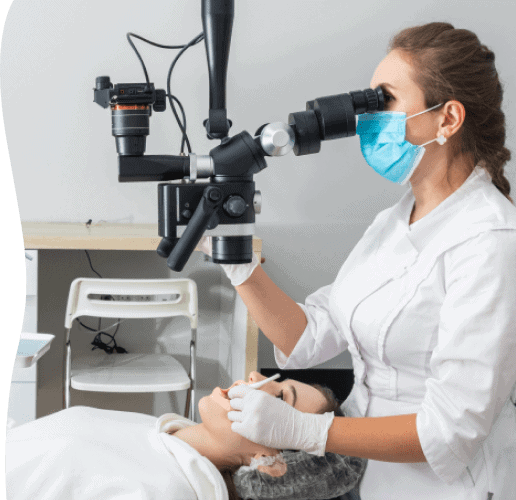Did you know that certain lifestyle factors, such as smoking, can play a significant role in the success of dental implants? It is important for patients to know the potential risks and complications associated with smoking and dental implant procedures.
This article will explore the connection between dental implants and smoking, discuss the smoking effects on dental implants due to tobacco, nicotine, and other chemicals found in cigarettes, and explain how it affects the healing period and osseointegration of implants. This write-up will also discuss increased risk factors for smokers, such as the potential for infection and reduced blood flow, and offer guidance on managing risks for smokers looking to undergo dental implant surgery.
Dental patients can make informed decisions regarding their oral health by comprehensively understanding the relationship between smoking and dental implant complications.

Summary of the Article
- Dental implants are artificial tooth roots that offer a long-term solution to missing teeth. This guide provides a comprehensive look at the osseointegration process, where the titanium implant fuses with the jawbone, and the impact of smoking on this process.
- Smoking effects on dental implants can complicate the success of dental implant procedures. This piece details how harmful chemicals in cigarettes can increase the risk of infection and implant failure.
- The dental implant success rate for smokers is lower than for non-smokers. Various factors like oral hygiene, post-operative care, and overall health can influence the outcome.
- Steps can be taken to manage and reduce the risks of dental implants for smokers, such as quitting smoking, maintaining good oral hygiene, and following post-operative care instructions.
- Other tooth replacement options for smokers worried about potential complications with dental implants are explored, including dental bridges and removable dentures.
- Dental professionals play a crucial role in managing risks for smokers. Open communication, regular check-ups, and diligent maintenance can help improve the chances of successful implant treatment.
The Science Behind Dental Implants
Dental implants are artificial tooth roots made of titanium that are surgically planted into the jawbone to replace missing or lost natural teeth. Titanium is a biocompatible material that integrates with the jawbone through osseointegration. The osseointegration process refers to the process by which the jawbone fuses with the titanium implant.
This strong bond between the implant and the bone creates a stable foundation for attaching dental crowns or bridges, restoring the appearance and function of a patient’s smile. Unfortunately, cigarette smoking impedes oxygen flow to the blood, which is essential for generating new oral tissue cells. As a result, the osseointegration process becomes much less predictable.
What Makes Dental Implants Unique
Dental implants offer several unique advantages compared to tooth replacement options such as dentures or dental bridges. Firstly, their integration with the jawbone provides excellent stability and support for the dental prosthesis, allowing patients to eat, speak, and smile confidently. Moreover, implants help preserve the jawbone by stimulating it similarly to natural tooth roots, preventing bone loss that can occur after tooth extractions.
Dental implants can last for many years, making them a long-term solution for those looking to restore their smile. However, it’s crucial to follow a good oral hygiene routine and attend regular dental check-ups for the ongoing success of the implants. The natural healing process for your jawbone may take up to three to six months, following which a metal fixture will be attached to the implant.
After the dental implant surgery, the recovery period can last about two weeks. Your dental implant dentist may advise you to quit smoking completely or substantially reduce your cigarette consumption during this period.
Smoking Effects on Dental Implants
Undeniably, smoking holds a reputation for negatively influencing overall health, notably oral well-being. This has direct implications for various dental procedures, particularly when considering smoking effects on dental implants. Heavy smokers face a higher risk of developing gum disease, tooth decay, and tooth loss, which can all negatively impact the success of dental implant procedures. The presence of nicotine, tobacco, and other harmful chemicals in cigarettes can cause various complications, from delayed healing to an increased risk of infection and implant failure.
Understanding the Risks for Smokers
For smokers considering dental implant treatment, it is vital to understand the specific risks associated with their habit. Research has shown that the dental implant success rate for smokers is lower than for non-smokers due to poor blood flow, compromised immune response, and increased susceptibility to infection.
During the initial days following the oral surgery, your body generates blood clots in and around the implant area. These clots serve as a protective barrier over the surgical site, preventing the entry of food particles, bacteria, and debris. However, inhaling smoke may dislodge these blood clots, leading to a painful condition called dry socket. Mouth dryness fosters the proliferation of harmful bacteria, heightening the frequency and severity of gum, or periodontal, disease. Smokers should know these risk factors and work closely with their dental professionals to manage and mitigate the potential complications.
How Smoking Compromises the Healing Process
One of the main challenges smokers face when undergoing dental implant surgery is compromising the entire healing process. Nicotine, a key component of cigarette smoke, constricts peripheral blood vessels, reducing blood flow and oxygen delivery to the surgical site. This diminished blood supply can result in delayed healing, an increased risk of dry sockets, and a higher likelihood of implant failure.
Furthermore, cigarette smoke creates a more favourable environment for bacteria to thrive, increasing the risk of infection during the healing period. Nevertheless, most experts concur that although smoking presents a risk factor for dental implants, it does not necessarily serve as an absolute contraindication. To improve the chances of successful implant treatment, smokers must discuss their good and bad habits with their dental professionals and consider smoking cessation strategies.
Dental Implant Success Rate for Smokers
While dental implants have become a popular and reliable tooth replacement option for many patients, it is important to acknowledge that the dental implant success rate for smokers can vary depending on an individual’s overall health and habits. In particular, smokers face unique challenges that can adversely affect the outcome of surgical procedures and their long-term success.
Comparing Success Rates for Smokers and Non-Smokers
The Journal of the International Society of Preventive and Community Dentistry presents a study indicating an increased likelihood of dental implant failure for individuals who smoke compared to those who refrain from the habit. The exact difference in success rates can vary depending on the study and population. Still, it is generally agreed upon that smoking poses a significant risk to the longevity and stability of dental implants.
It is worth noting that heavy smokers experience even greater risks and poorer outcomes compared to light or occasional smokers. For the best possible results, patients should consider quitting smoking before dental implant surgery and maintaining a smoke-free lifestyle.
Factors That Affect Dental Implant Outcomes
Various factors can influence the success of dental implant treatment, including the patient’s overall health, oral hygiene practices, and adherence to post-operative care instructions. For smokers, these factors are compounded by the negative effects of nicotine, tobacco, and other harmful substances in traditional cigarettes. Smoking compromises the body’s ability to heal, increases the risk of infection, and impairs blood flow, which can negatively impact dental implant outcomes. In addition, the occurrence of marginal bone loss after an implant procedure is higher in smokers than non-smokers.
Get Outstanding Dental Care with Us Today
At The Smile Space, we believe that comprehensive dental care should be accessible to everyone. Our experienced team is dedicated to providing the highest standard of care, using the latest technology and techniques. If you're looking for a dentist in Sutherland, book an appointment at The Smile Space today!

Reducing the Risks of Dental Implants for Smokers
While it is clear that smoking poses significant risks to the success of dental implants, some steps can be taken to help manage and reduce these risks. By working closely with dental professionals and following recommended guidelines, smokers can improve their chances of achieving successful and long-lasting dental implant results.
Preparing for a Dental Implant Procedure
Before undergoing a dental implant procedure, smokers should consider lifestyle changes to improve their oral health and increase the likelihood of a successful outcome. Quitting smoking, even temporarily, can significantly impact the body’s ability to heal and reduce the risk of complications. Also, maintaining good oral hygiene practices, such as regular brushing, flossing, and dental check-ups, can help create a healthier environment for implant treatment.
Post-Operative Care for Smokers
After dental implant surgery, smokers must diligently follow their dentist’s post-operative care instructions. This may include avoiding smoking for a specified period, using prescribed mouthwashes or medications, and attending regular follow-up appointments. Smokers should also maintain proper oral hygiene during the healing period to prevent infection and support implant integration. By adhering to these guidelines and working closely with their dental professionals, smokers can help minimise the risks associated with their habit and increase the chances of a successful dental implant outcome.
Alternatives to Dental Implants for Smokers
It is worth considering alternative tooth replacement options for smokers concerned about the potential complications associated with dental implants. While dental implants offer many advantages, other treatments may be more suitable for those with a history of tobacco use.
Other Options for Tooth Replacement
Apart from dental implants, several other tooth replacement options are available, including dental bridges and removable dentures. Dental bridges involve the placement of a false tooth that is anchored to the neighbouring teeth. At the same time, removable dentures replace multiple missing teeth with a removable appliance. Both options can effectively address tooth loss, but they have their own benefits and drawbacks.
Pros and Cons of Different Treatments
When choosing a tooth replacement option, weighing the pros and cons of each treatment is important. Dental bridges, for example, can be less invasive and more affordable than dental implants. However, they may require the alteration of healthy adjacent teeth and may not last as long as dental implants. Removable dentures can be more cost-effective and less invasive. However, while these alternatives may offer some advantages, they don’t match up to dental implants in terms of comfort, stability, and functionality. Additionally, they lack the ability to prevent jawbone loss, a crucial benefit offered by dental implants.
The Role of Dental Professionals in Managing Risks for Smokers
Dental professionals are crucial in managing risks for smokers. By providing comprehensive information, guidance, and support, they can help patients make informed decisions about their treatment options and navigate the challenges that smoking may present.
The Importance of Honest Communication
Honest communication between patients and their dental professionals is essential for the success of dental implant treatment. Patients should disclose their smoking habits and be open about their concerns. At the same time, dental professionals should provide clear and accurate information about the potential risks and complications associated with dental implants and smoking. This open dialogue allows for the development of an individualised treatment plan that considers the patient’s unique circumstances and risk factors.
Regular Check-ups and Maintenance for Dental Implants
For smokers who choose to undergo dental implant treatment, regular check-ups and maintenance are crucial for the long-term success of their implants. Dental professionals can monitor the health of the implant site, the surrounding soft tissue, and the patient’s overall oral hygiene, making any necessary adjustments to the treatment plan. By staying proactive and vigilant, patients and dental professionals can work together to minimise the health risks associated with smoking and dental implants, ultimately improving the chances of a successful outcome.
Final Thoughts
Understanding the link between complications from dental implants and smoking is essential for patients. Smokers should be aware of the increased risks and the impact of their habits on the success rate of dental implants. With proper communication, careful planning, and adherence to a maintenance routine, smokers can improve their chances of a successful dental implant procedure.
For those considering dental treatment who want to know more about their options, scheduling a consultation at The Smile Space is highly recommended. The team at The Smile Space will provide personalised advice, explain the procedure, discuss the estimated cost, and help make an informed decision about one’s oral health. To book an appointment, visit The Smile Space website or contact the clinic today.







